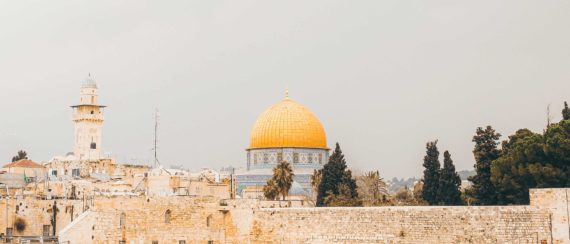
As a boy of 13 he was now to see for the first time the Holy City. His heart beat fast with joyous anticipation of soon beholding the city and house of his heavenly Father. His dad told him it was just beyond the ridge of the Mount of Olives. From the time of leaving home (Nazareth) with his mum and dad (Mary and Joseph), until he reached the summit of the Mount of Olives, Jesus experienced …one long stress of expectant anticipation… (125.0.3, 1377.3)
Hurrying on their journey to Jerusalem for the Passover week, on this Thursday afternoon as they passed through Bethany, they were invited for refreshment by a man called Simon, and met his three children – Mary, Martha and Lazarus. They were about Jesus’ age and a lifelong friendship instantly sprang up between the two families.
Not stopping for long, as they wanted to get to Jerusalem before nightfall, they reached the brink of Olivet.
At no time in his life did Jesus ever experience such as purely human thrill as that which at this time so completely enthralled him as he stood there on this April afternoon on the Mount of Olives, drinking in his first view of Jerusalem. [Paper 142:6.10, page 1375.4]
As it was late in the afternoon, they decided to go to their accommodation straight away, and sight see the next day. They passed the temple and on closer inspection from the outside the temple was all and more than Jesus had expected. They soon reached where they were to stay for the week, the large home of a well-to-do relative of Jesus’ mum.
The next day arrived and Jesus was …profoundly impressed by the temple and all the associated services and other activities. (124:6.14, 1375.8) However, …when he once entered its sacred portals, the great disillusionment began. (125:0.3, 1377.3) He said little, and the few questions asked of his dad, such as why it was that the heavenly Father required the mass slaughter of “innocent and helpless” animals, indicated his disappointment.
The emotional impact of being in Jerusalem this first time was so intense that on the day before the Passover Sabbath, that …flood tides of spiritual illumination swept through the mortal mind of Jesus and filled his human heart to overflowing with affectionate pity for the spiritually blind and morally ignorant multitudes assembled for the celebration of the ancient Passover commemoration. (124:6.15, 1375.1)
In actual truth and fact …this was one of the most extraordinary days that the Son of God spent in the flesh. (124:6.15, 1376.1)
Though many of the temple rituals very touchingly impressed his sense of the beautiful and the symbolic he was always disappointed by the real meaning of these ceremonies…. [Paper 125.06, page 1378.1]
However, it was when he went through the temple courts that …he was shocked and sickened by the spirit of irreverence which he observed. He deemed the conduct of the temple throngs to be inconsistent with their presence in “his Father’s house”. (125:1.1, 1378.3)
And by the time he got to the priest’ courts, with the killing of droves of animals, blood-stained hands of the slaughter priests, and the sounds of dying animals, the boy was sickened, and clutching his dad’s arm he begged to be taken away. That night …he had revolting dreams of slaughter and suffering. His mind was distraught and his heart torn by the inconsistencies and absurdities of the theology of the whole Jewish ceremonial system… (125:2.4, 1379.5)
And so the Passover week proceeded. Again and again his parents would find him sitting off by himself with his youthful head in his hands, profoundly thinking. (125:2.9, 1380.4)
One major highlight for Jesus during that week was meeting scores of boys about his age, fellow candidates for consecration, in total he met …and more or less extensively interviewed, more than one hundred and fifty. He was particularly interested in those who hailed from the Far-Eastern and the remote Western countries. (125:2.12, 1380.7)
Rather than wander too far off the topic of deep cleaning, suffice to say, that by the end of the week Jesus’ parents were relieved to be going home to Nazareth.
So off Joseph and Mary went, each assuming that the other had Jesus in tow. Men and women being required to travel separately, it was only at a night stopover in Jericho that they realised that Jesus had been left behind in Jerusalem. He had remained in the temple listening to the discussions and “enjoying the more quiet and decorous atmosphere, the great crowds of the Passover week having about disappeared”. It appears that he was so preoccupied, that his being abandoned was of little concern to him. When temple discussions ended, he went to the home of his Bethany friends who were thrilled to have him stay. We are told that …early next day Jesus was up and on his way to the temple. On the bow of Olivet… this 13 year old boy …paused and wept over the sight his eyes beheld – a spiritually impoverished people, tradition bound, and living under the surveillance of the Roman legions. (125:4.2, 1381.4)
And for the next three days he took part in the discussions with the scribes and teachers in the temple, in effect asking questions and ending up confusing the “wise men of the law”. All ended abruptly on the fourth day when his parents found him.
And they immediately left for the three-day journey back home to Nazareth. Jesus and his parents paused briefly on the way to Jericho for the first night’s stay, on the brow of Olivet. There …the lad raised his staff aloft and, quivering from head to foot under the surging of intense emotion, said: “O Jerusalem, Jerusalem, and the people thereof, what slaves you are – subservient to the Roman yoke and victims of your own traditions – but I will return to cleans yonder temple and deliver my people from this bondage!” (125:6.9, 1384.5)
It could be regarded that this was the histrionics of a young adolescent, particularly as no temple cleaning urge was mentioned by Jesus thereafter. All that was observed by those who knew him well was that by the time he was 20 he had developed …a strange and increasing aversion to this Herod-built temple with its politically appointed priesthood. (12:6.5, 1404.4)
And then, about 23 years after his promise, with only four more days of life as a man of Urantia, the urge to deep clean again erupted, catching all of us by total surprise.
That never-to-be-forgotten Monday morning, there he was in the temple on the teaching platform trying to teach the gospel of the heavenly kingdom one moment and the next, with an enthusiasm, zeal, and expertise that astounded us, executed the deep clean of the temple. It didn’t take him more than a few minutes to perfectly complete the task, after which he immediately returned to the teaching platform and resumed his teaching. (p.1890.2)
 To my knowledge no more deep cleans of the temple in Jerusalem were undertaken for the next 70 years, give or take a few, when any further cleaning issues were successfully resolved by the Romans demolishing the temple.
To my knowledge no more deep cleans of the temple in Jerusalem were undertaken for the next 70 years, give or take a few, when any further cleaning issues were successfully resolved by the Romans demolishing the temple.
Thus ends the story of the Jerusalem temple deep clean.

